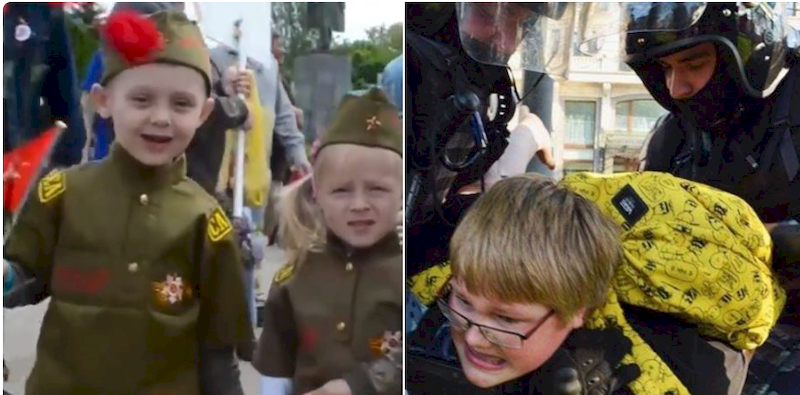Putin’s ‘Russian World’: Children taught war and violently detained for daring to protest

The increasing militarization of childhood in occupied Crimea and Russia is beginning earlier and earlier, with children decked out in military uniform and taking part, together with the Russian defence ministry’s ‘Youth Army’, in military and other parades for Victory Day. It is known that some of the schoolkids and university students were coerced into taking part, but this is only one of the shadows over the Victory-mania particularly stirred up since Russia’s invasion of Crimea and military aggression in Eastern Ukraine. The events took place just days after protests against Vladimir Putin’s fourth inauguration as Russian President resulted in around two thousand demonstrators being detained, many of them children and young adults.
Ukrainian commentator Pavlo Kazarin says that Russia has turned the ‘Great Patriotic War ‘(1941-1945) into a religion, and like all religions, there are canonical beliefs which one cannot deviate from without being condemned as a heretic. No discussion or modification of the old myths is allowed, however this, he believes, will sooner or later change. All myths, he notes, have their sell-by date.
This is likely true, but what is now taking place in occupied Crimea and Russia seems far-removed from the Victory Day events of the past, and this is about much more than the ever-increasing number of ‘fake veterans’, some of whom were not even born in 1945. There was a huge show of Russian military hardware in several cities of occupied Crimea, with this in parallel to the procession in which small children in military outfits and the Ministry of Defence’s ‘Youth Army’ [Yunarmia) took part. Russia’s Defence Minister Sergey Shoygu has quite openly stated that a major goal of the Yunarmia movement is to popularize military ideology and foster a special bond “between young Russians and the army”. Russia is now illegally conscripting young Crimeans into the Russian army, and is also making a major drive to push membership among younger Crimeans of this ‘Youth Army’ which has been likened to Hitlerjugend and other “formations in which young people became tools of totalitarian regimes in Europe”.
One father from Sevastopol reported seeing three small children decked out in military uniform and camouflage gear when he went to pick up his child from kindergarten. That was back on 27 April, with more than a week to go to Victory Day. They are teaching their children WAR, he says.
The lessons are often given by schools and kindergartens, with the orders almost certainly coming from higher up. There have been some complaints about kids being forced to take part in the ‘Immortal Regiment’ processions, but in most cases, school students are given no choice and university students left in no doubt that they face problems if they don’t appear.
The number of children this year wearing military uniform may in part be a fashion that took grip among more affluent parents, but the development was doubtless encouraged by the institutions which staged ‘children’s military parades’ and the like.
Back in 2017, the events in Crimea were overtly aimed at propaganda and encouraging children to glorify the Russian invading soldiers and war in general. At a concert in Sevastopol on the third anniversary of annexation, young girls danced about the stage, singing “My country, my fate, my dream, my war”. At that point, other children burst onto the stage waving mock machine guns around or flourishing Russian flags.
At another stunt, young children dance around the monument to the Russian soldiers who invaded Crimea, loudly shouting “thank you” in unison.
Russia began implementing its Strategy on education and upbringing of children back in 2014. This calls one of the tasks in education being “the formation in children of patriotism, a feeling of pride for their Motherland, willingness to defend the interests of the Fatherland, responsibility for the future of Russia based on the development of programs of patriotic upbringing, including military-patriotic upbringing”. As part of ‘Lessons of courage and patriotism’, children from one Simferopol school were taken to a Russian military unit.
There are also camps and ‘military-sport’ games for learning the state-approved version of ‘patriotic awareness’ while training with Kalashnikov rifles.
All of this is very public and visible. The same cannot be said of the protests in Russian cities which were not shown on the Russian state-controlled media at all. The fact that there do not appear to have been any protests in Crimea is most likely a reflection of the even greater level of repression there. Under Russian occupation, protests are few and far between and normally end in detentions.
In Moscow on 5 May, Cossack units, trained by the Moscow Mayor’s office, attacked anti-Putin protesters, a number of whom were detained by riot police, often with gratuitous force.
One of the most shocking features of the arrests that day was the number of very young kids detained for coming out onto the street to protest against a president who had ruled Russia since before they were born.





